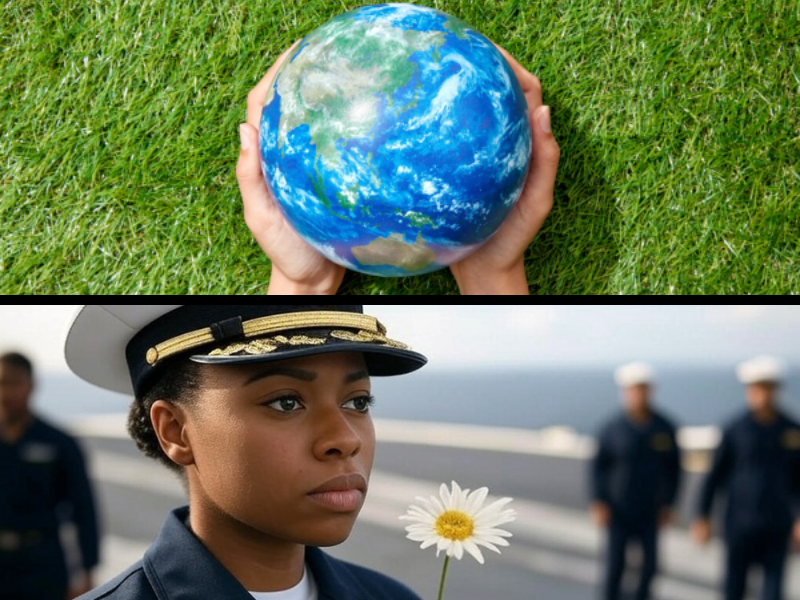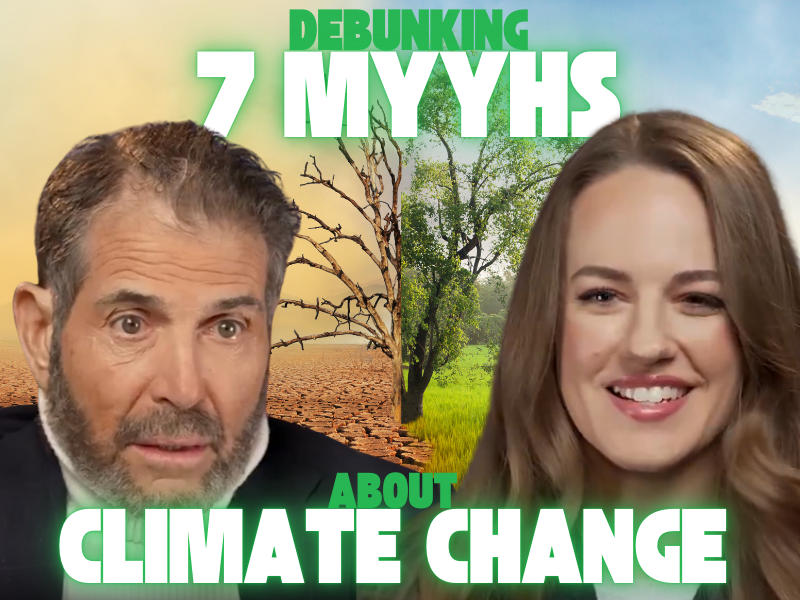Climate Change Weekly #187
SUBSCRIBE to your inbox
Pope Francis’s visit to America has included speeches at The White House, the Capitol, and in Philadelphia. In each speech, the pope made at least a brief mention of his opinion governments must act now to prevent dangerous human-caused climate change.
In a Human Events article I discussed how the pope either has been misled or is being willfully ignorant concerning climate science, writing:
None of the disasters asserted by climate alarmists to result from global warming has come to pass. Hurricane numbers are down, deaths from natural disasters have declined, sea ice is on the rise, and crop production is increasing. Climate models have yet to be validated, missing the lull in temperature rise for the past 18 years and the declining rates of sea-level rise for the past decade. Instead, the gap between temperatures projected by climate models and temperature observed in reality grows yearly.
Despite the best efforts of many to educate the pope on the virtues of capitalism and the widespread use of fossil fuel, Francis continues to decry both.
The most eloquent description of Pope Francis’s folly comes, not surprisingly, from George Will, whom I quote here at length:
Pope Francis embodies sanctity but comes trailing clouds of sanctimony. With a convert’s indiscriminate zeal, he embraces ideas impeccably fashionable, demonstrably false and deeply reactionary. They would devastate the poor on whose behalf he purports to speak …
This man who says “the Church does not presume to settle scientific questions” proceeds as though everything about which he declaims is settled. … The church that thought it was settled science that Galileo was heretical should be attentive to all evidence.
Our flourishing requires affordable, abundant energy for the production of everything from food to pharmaceuticals. Poverty has probably decreased more in the past two centuries than in the preceding three millennia because of industrialization powered by fossil fuels. Only economic growth has ever produced broad amelioration of poverty, and since growth began in the late 18th century, it has depended on such fuels.
Matt Ridley … notes that coal supplanting wood fuel reversed deforestation, and that “fertilizer manufactured with gas halved the amount of land needed to produce a given amount of food.” The capitalist commerce that Francis disdains is the reason the portion of the planet’s population living in “absolute poverty” ($1.25 a day) declined from 53 percent to 17 percent in three decades after 1981. Even in low-income countries, writes economist Indur Goklany, life expectancy increased from between 25 to 30 years in 1900 to 62 years today. Sixty-three percent of fibers are synthetic and derived from fossil fuels; of the rest, 79 percent come from cotton, which requires synthetic fertilizers and pesticides. “Synthetic fertilizers and pesticides derived from fossil fuels,” he says, “are responsible for at least 60 percent of today’s global food supply.” Without fossil fuels, he says, global cropland would have to increase at least 150 percent – equal to the combined land areas of South America and the European Union – to meet current food demands.
— H. Sterling Burnett
SOURCES: Human Events and Washington Post
IN THIS ISSUE …
Developing nations jointly fight climate obligations … China’s fibs complicate climate negotiations … Sorry state of climate science communications … Using courts to suppress climate debate … New Australian PM, same climate policies
DEVELOPING NATIONS JOINTLY FIGHT CLIMATE OBLIGATIONS
At the end of a two-day meeting in New Delhi, India on September 15, India and 12 other developing countries – Argentina, Bolivia, China, Cuba, Ecuador, El Salvador, Iran, Malaysia, Nicaragua, Saudi Arabia, Venezuela, and Vietnam – said they would resist any “obligatory review mechanism” intended to increase their individual efforts to curb greenhouse gas emissions. The countries also agreed their signing of any climate agreement in Paris would be dependent on developed countries financing, as promised, a clean development/climate fund.
Climate change negotiators from the like-minded developing countries (LMDC), as they call themselves, said any review of actions to curb greenhouse gas emissions should factor in the differential responsibilities of developed and developing countries. At previous climate change conferences, developed countries had agreed to support developing countries through technology transfers and financing with a $100 billion per year fund beginning in 2020. Thus far pledges to the fund are less than $10 billion.
Addressing the LMDCs, India’s environment and forests minister, Prakash Javadekar, said, “In loss and damage, there is double speak. When a hurricane happens, they see the gravity of climate change, when some country asks for loss and damage on that account, they come out with the logic that one has to prove whether it is climate change event or a natural event – when compensation is to be paid, it is a natural event, when there is no claim then it becomes a climate change event.”
Javadekar added, “… if [the] developed world doesn’t walk the talk on [the] issue of finance, there will be a problem for the Paris outcome.”
SOURCES: Times of India and Live Mint
CHINA’S FIBS COMPLICATE CLIMATE NEGOTIATIONS
A new analysis of Chinese government data by the U.S. Energy Information Administration found over the past decade, China has burned 14 percent more coal than it acknowledges, and its domestic coal production was 7 percent higher between 2000 and 2013 than previously reported. The new analysis means China consumed hundreds of millions more metric tons of coal than previously understood. The upward revision illustrates how difficult it is to get an accurate account of China’s carbon dioxide emissions. In the past, EIA noted national totals frequently don’t match the sum of provincial totals.
SOURCE: Wall Street Journal
SORRY STATE OF CLIMATE SCIENCE COMMUNICATIONS
Journalist Axel Bojanowski writes, in the popular German news publication Der Spiegel, a harsh critique of dishonesty in climate research and reporting. The article’s sub-headline states his main point: “Reports on climate science are hardly trustworthy, analyses show. The reason is biased journalists, hyping politicians and arrogant scientists.” According to Bojanowski significant uncertainties in climate science are rarely mentioned. As an example Bojanowski cites the 2007 report of the United Nations Intergovernmental Panel on Climate Change, which claimed hurricanes were growing in intensity. There hasn’t been a single major hurricane strike in the United States since that report was released, and hurricane numbers and intensities are at historic lows. Bojanowski also rebukes journalists for stubbornly clinging to the unscientific notion of consensus, despite the fact a recent survey of 1,868 climate scientists found no consensus concerning the causes, consequences, or appropriate responses to climate change.
SOURCE: No Tricks Zone and Der Spiegel (German, English version not yet posted
USING COURTS TO SUPPRESS CLIMATE DEBATE?
Both in the United States and internationally, some scientists and lawyers are advocating courts settle climate science disputes and punish climate skeptics. The Guardian (UK) reports Phillipe Sands, director of the Centre on International Courts and Tribunals at University College London, recently told an audience that the United Nations should request the International Court of Justice to settle the scientific dispute over the human cause and consequences of climate change, thus paving the way for future legal cases to force governments to act to prevent catastrophic climate change. According to Sands, since bodies such as the United Nations Intergovernmental Panel on Climate Change (IPCC) have concluded climate change is underway and caused by humans, “One of the most important things an international court could do – in my view it is probably the single most important thing it could do – is to settle the scientific dispute,” Sands said. “A finding of fact on one or more of these matters [such as whether climate change is man-made], or indeed on other pertinent matters, would be significant and authoritative and could well be dispositive on a range of future actions …”
Meanwhile in the U.S. on September 1, a group of 20 climate scientists signed a letter addressed to President Barack Obama, Attorney General Loretta Lynch, and Office of Science and Technology Policy Director John Holdren requesting they use the Racketeer Influenced and Corrupt Organizations Act (RICO) to investigate corporations and other organizations “that have knowingly deceived the American people about the risks of climate change, as a means to forestall America’s response to climate change.” The list of signatories includes several members of the National Academy of Sciences and numerous IPCC authors.
Judith Curry responded strongly, pointing out the material cited as evidence of a criminal conspiracy between skeptical scientists and industry, including the movie/book Merchants of Doubt, has been widely discredited. Curry notes there is no consensus concerning the causes of climate change, the dangers it poses, or the appropriate responses to it. Curry concludes by condemning the scientists signing the RICO letter: “What you have done with your letter is the worst kind of irresponsible advocacy, which is to attempt to silence scientists that disagree with you by invoking RICO. It is bad enough that politicians such as Whitehouse and Grijalva are playing this sort of political game with science and scientists, but I regard it as highly unethical for scientists to support defeating scientists with whom you disagree by such methods.”
Curry closes saying climate scientist Peter Webster did not exaggerate when he wrote an email to one of the letter’s authors, “‘You have signed the death warrant for science.'”
SOURCES: Climate Etc. and The Guardian
NEW AUSTRALIAN PM, SAME CLIMATE POLICIES
In the aftermath of an election within the Liberal Party that resulted in Malcolm Turnbull replacing Tony Abbott as head of the party and as Australia’s prime minister, the world should not expect a major shift in Australia’s climate policies. Abbott ditched Australia’s carbon pricing mandates and cut subsidies for renewable energy. While historically Turnbull was seen as more friendly than Abbott to policies to battle climate change, his views have evidently changed since his support for the country’s emissions trading scheme cost him his job as opposition leader in 2009. During a 2014 Australian Broadcasting Corp. interview Turnbull stated, “emissions trading schemes have worked better in theory than in practice.” Turbull praised the Abbott government’s exiting climate policies, describing them as “a very, very good piece of work.”
At almost the same time as the Liberal Party and Australian government were undergoing their change in leadership, the Federal National Party (FNP) rejected by a 43–34 vote a motion calling for support of the renewable energy sector and for the federal government to back regional renewable energy projects.
Queensland National Party Womens’ President Theresa Craig spoke against government support for renewable energy. She said, “I’d love to support this but I can’t because the facts do not add up. Unfortunately the Green propaganda has not given us the facts.” Referencing a study by the Queensland University of Technology, Craig said, “Today, 5 percent of clean energy adds an extra 15 percent to our utility bill.” Craig also cited research by The Heartland Institute showing every job created in renewable energy sector resulted in the loss of two to three jobs.
SOURCES: Washington Post and Farm Online





